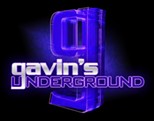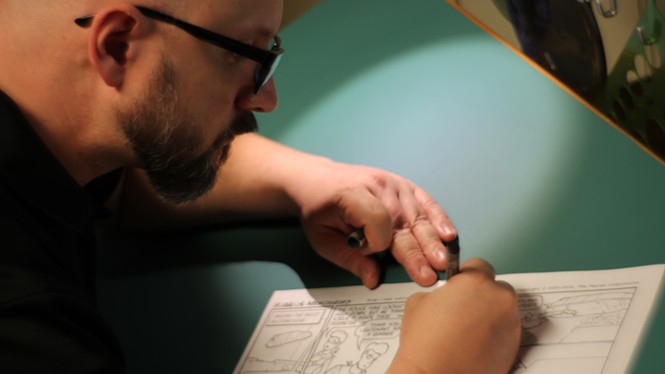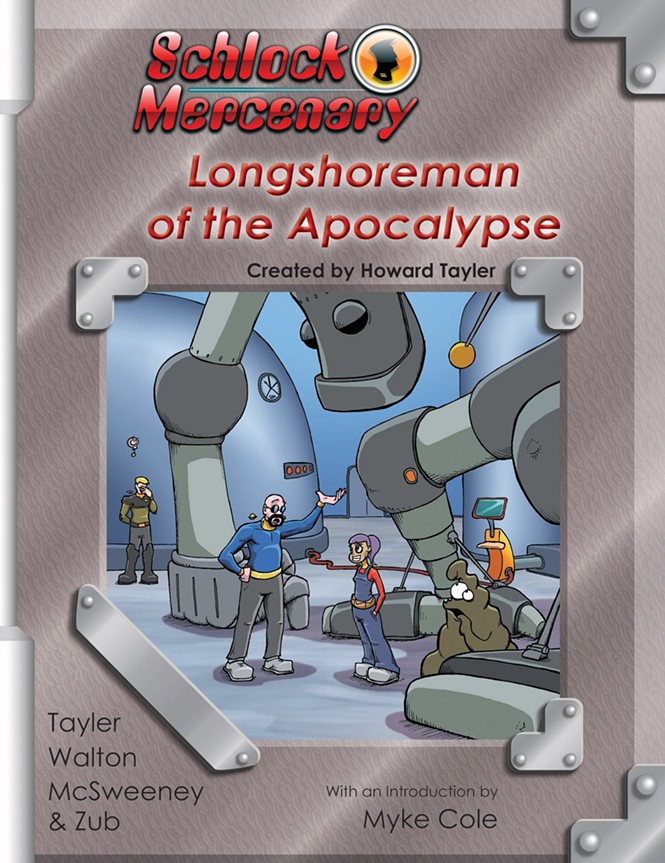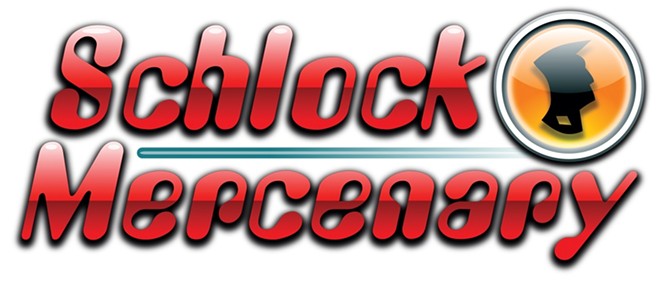Support the Free Press | Facts matter. Truth matters. Journalism matters
Salt Lake City Weekly has been Utah's source of independent news and in-depth journalism since 1984. Donate today to ensure the legacy continues.
Sunday, August 31, 2014
Howard Tayler
Posted By Gavin Sheehan on August 31, 2014, 11:55 PM
So if you didn't know by the hundreds of ads and stories that have been happening this week, the Salt Lake Comic Con is about to take over the Salt Palace this weekend. While many people are super-obsessed with the celebrities traveling in, we're gonna focus more on some of the local talent you may not be aware of. Today, we're going to chat with writer and illustrator, Howard Tayler, creator of Schlock Mercenary and co-host of the Writing Excuses podcast. (All pictures courtesy of Tayler.)
Howard Tayler
SchlockMercenary.com
Gavin: Hello Howard! First thing, what first got you interested in comics and what were some of your favorite titles growing up?
Howard: I grew up loving comic strips, especially Bloom County, Calvin & Hobbes and The Far Side. I didn't get into comic books very much until Claremont's Excalibur launch, and by then I was 20, so the "growing up" part had phased into "I guess I'm not getting any taller.”
Gavin: How did you get into drawing comics and how was it for you finding your style?
Howard: I came to this late. I was 31, and I thought webcomics in strip format looked like a fun way to tell a story. So I started teaching myself to draw, and I started creating the strip. My style is a mish-mash that evolved out of a lot of things, including looking around at other comics to figure out how they handled the representation of the sorts of things I needed to draw.
Gavin: Did you take any formal training or classes to learn how to draw, or were you mainly self-taught?
Howard: I took an introduction to drawing class at BYU back in 1985. It wasn't particularly useful 15 years later when I started cartooning, but I did at least know how to hold the pencil.
Gavin: You came to Utah from Florida in 1985. What was it like coming here and what made you decide to stay?
Howard: Standard BYU pilgrimage. I came out here for school, left from here to go on a mission, and never really went back to live in Florida. The biggest changes were the cold (which was nothing compared to the cold in North Dakota, where I began my mission) and the altitude.
Gavin: While in Utah you earned a degree from BYU in music composition and were working at Novell. Prior to comics, what were you trying to achieve career-wise and how was that time for you?
Howard: I grew up wanting to be a rock star. My work with Macintosh computers in the studio landed me a tech support "day job," which really became my career for a decade. I moonlighted as a record producer, but my music career was on a long, slow decline the moment I started spending 8 hours a day doing something else. Reversing that decline while switching creative fields was kind of miraculous. I don't know how I pulled it off.
Gavin: How did the idea for Schlock Mercenary come about?
Howard: That's a pretty boring question. A better question is "how did you turn the soup of ideas that you started with into something coherent?" And the answer there is that for every speculative "what if..." idea, there are a dozen follow-up "but doesn't that mean..." questions. Asking and answering those is the secret to turning a good idea into a great project. Ideas are cheap. I have more of them than I can use. Execution on ideas is what really matters. The short version went like this: I wanted a science-fiction setting with adventure, conflict and lots of travel (see Space Opera.) I figured the easiest way to get that would be to focus the story on a group of unaffiliated mercenaries who go fight things where the money is. I then wrapped some corporate humor around it, and started satirizing whatever came to mind. And after about 18 months of this, I finally got my storytelling legs under me, and I was able to get the ideas to line up all nice and orderly-like so I could execute them in a very straightforward manner rather than wandering around.
Gavin: What made you decide to publish the comic online rather than create a physical book?
Howard: At risk of alienating half the community, I don't think it makes any sense at all for a new creator with a new title and no audience at all to go for print. Why sink money into print product that has no market? Sure, established creators can succeed with new independent titles, but that's not what I was. Back then, I couldn't have articulated this. I just knew I wanted to draw comics, and webcomics were fun to read, so I should draw a webcomic that would be fun to read. Going directly to print was so absurd the idea never crossed my mind.
Gavin: What was the community response like to the book during the first year, and what persuaded you to quit your job and work on it full time?
Howard: I didn't quit my day job until four years in, and it wasn't because the strip was paying the bills. That said, by the time we had a print product ready, we were able to sell 1900 copies inside of 30 days, which paid for the print run and paid all our bills for the next six months. So I guess the community response was "1900 people ponied up money enthusiastically." I'm very, very grateful for that.
Gavin: How was it for you during the first couple of years working on the comic and other side projects?
Howard: Miserable, terrifying, exhilarating, depressing, hilarious and wonderful. I'm not a fan of the miserable and terrifying parts. We got through them, though.
Gavin: What's the process like for you when creating a new storyline as part of the series?
Howard: Currently I have an overarching story that all book-length storylines fit within. I look at where we are in the big story, which pieces need to be advanced, revealed, or otherwise told during the next book, and then I find a fun framework in which to tell those pieces. Then I select some characters to focus on, and I let their individual arcs drive the plot. Mostly I do this by the seat of my pants. It's scary, but in a good way, like skydiving. Assuming the parachute works.
Gavin: How often do you end up changing the story and taking side-trips between where you start and where you end?
Howard: All the time. Every book has them. Sometimes the side trip explores something that I discovered I would need for later. Sometimes it's just me noodling around on something interesting.
Gavin: How did you get involved with Skull Island eXpeditions, and how has it been contributing to that series?
Howard: The series has been a lot of fun, and has also been hugely educational. For the first time ever I was working with an editor who needed me to fine-tune my writing, and the back-and-forth was completely foreign to me. I love the setting, though, so even when I'm grinding on edits I'm engaged in the story.
Gavin: Subsequently, you're also a contributing member to X-Treme Dungeon Mastery. What's it been like working on that project and illustrating the world those guys have created?
Howard: It's not really a "world," per se. XDM is a role-playing game supplement designed to fix everything that's wrong with all the other games that people might trying to run. My job was to make an entertaining read even more entertaining by illustrating it. We're working on XPC, the X-Treme Player Codex, next, and it's promising to be every bit as much fun, and possibly even more useful than the first title.
Gavin: You started a podcast in 2008 called Writing Excuses. What persuaded you to start that show and how did you get it started with Brandon Sanderson, Mary Robinette Kowal and Dan Wells?
Howard: Brandon and Dan started the podcast at the behest of Brandon's brother Jordan. They brought me in because they needed, and I'm not lying here, somebody famous to jump start the show with an audience. I signed on because it looked like fun, and we agreed on a format that I liked — tightly paced, tightly focused, no long rambling. Within a year, Brandon had been tapped to finish Robert Jordan's The Wheel Of Time series, and our audience quadrupled. Then we brought Mary on, and suddenly what had been kind of clever became downright erudite at times. These days Brandon, Dan and Mary are among my best friends, and I like that a lot more than I like the tangible rewards of the podcast.
Gavin: The show has been going more than six years now, how has it been giving out tips and lessons to young creators and helping influence the generation coming up?
Howard: Humbling, I suppose. I've had great authors compliment me on my brilliant insights on the podcast, and I smile and nod and say "I'm glad that worked for you" while trying not to let on that it wasn't an insight, it was me reaching for a punchline because the pacing of the podcast felt like it needed a joke right about then. In this business a lot of people talk about "imposter syndrome," which is when you feel like you're just making it up as you go along, and all the positive attributes that people ascribe to you are things that you're faking. I totally suffer from that. And I don't let it stop me from trying to say something that adds to the discussion in a helpful way.
Gavin: You've been nominated and won several awards over the years, including a Hugo Award in 2013. What's your take on receiving that kind of recognition from your peers?
Howard: Awards are like marmosets. They're not huge things, and in the process of striving to catch one you're likely to get hit with some poo. Also, that's a terrible metaphor. But hey, monkey! I'm deeply honored to have been nominated for Hugo and Parsec awards. The Writing Excuses Hugo win in 2013 was, for me anyway, a challenge from the community to continue creating the podcast. It wasn't a laurel to rest on, not by any stretch. Of course, as I wrote this paragraph I looked up and to the left at least three times to admire the trophy on the mantle behind my computer monitor. It's totally not a marmoset.
Gavin: Do you have any projects on the horizon that you can share with us?
Howard: Sure. I'm working on a novel-length story set in the same universe as my Runewright stories from the Space Eldritch anthologies. That setting has stuck with me as a place that has lots of stories in it, and I'm ready to tell a big one.
Gavin: What will you be doing at this year's Salt Lake Comic Con?
Howard: Outside of the panel discussions I'll be a part of, I expect I'll be sitting at my booth and drawing comics. Stop by and watch! You don't need to buy a thing, although we won't try to stop you if commerce is what you're interested in.
Gavin: What are your thoughts on the Con itself and the impact its had locally?
Howard: Short version: It's great, and I'm glad Dan Farr and his team have put it together. I think it's good for the community of creators, good for the attendees, and good for Salt Lake City. Long version: "come see the film and television stars" isn't something that has ever interested me, so that part of the show is completely lost on me. These days "comic con" really means "genre-friendly pop-culture expo," probably as a result of the San Diego show's proximity to Hollywood, and the last decade of increased Hollywood presence there. Fortunately, I love watching the cosplayers walk by, and Comic Con has a really solid costuming community in attendance. And there are a zillion other things to see and do at the show, so it's never boring. Exhausting, yes, but never boring.
Gavin: What can we expect from you over the rest of the year?
Howard: Expect me to be difficult to find. I need to hide in my studio and get lots of things done. Expect the comic to update every day at SchlockMercenary.com, because that's what pays the bills. Expect some short fiction, and a new, 256-page Schlock Mercenary book in the store in time for Christmas.
Gavin: Aside from the obvious, is there anything you'd like to promote or plug?
Howard: I'll be doing a panel Writing and Mental Health at Salt Lake Comic Con. If readers are interested in getting to see what mental illness is like, I've published a piece of free non-fiction that lets them into my head for a ride.
Howard Tayler
SchlockMercenary.com
Gavin: Hello Howard! First thing, what first got you interested in comics and what were some of your favorite titles growing up?
Howard: I grew up loving comic strips, especially Bloom County, Calvin & Hobbes and The Far Side. I didn't get into comic books very much until Claremont's Excalibur launch, and by then I was 20, so the "growing up" part had phased into "I guess I'm not getting any taller.”
Gavin: How did you get into drawing comics and how was it for you finding your style?
Howard: I came to this late. I was 31, and I thought webcomics in strip format looked like a fun way to tell a story. So I started teaching myself to draw, and I started creating the strip. My style is a mish-mash that evolved out of a lot of things, including looking around at other comics to figure out how they handled the representation of the sorts of things I needed to draw.
Gavin: Did you take any formal training or classes to learn how to draw, or were you mainly self-taught?
Howard: I took an introduction to drawing class at BYU back in 1985. It wasn't particularly useful 15 years later when I started cartooning, but I did at least know how to hold the pencil.
Gavin: You came to Utah from Florida in 1985. What was it like coming here and what made you decide to stay?
Howard: Standard BYU pilgrimage. I came out here for school, left from here to go on a mission, and never really went back to live in Florida. The biggest changes were the cold (which was nothing compared to the cold in North Dakota, where I began my mission) and the altitude.
Gavin: While in Utah you earned a degree from BYU in music composition and were working at Novell. Prior to comics, what were you trying to achieve career-wise and how was that time for you?
Howard: I grew up wanting to be a rock star. My work with Macintosh computers in the studio landed me a tech support "day job," which really became my career for a decade. I moonlighted as a record producer, but my music career was on a long, slow decline the moment I started spending 8 hours a day doing something else. Reversing that decline while switching creative fields was kind of miraculous. I don't know how I pulled it off.
Gavin: How did the idea for Schlock Mercenary come about?
Howard: That's a pretty boring question. A better question is "how did you turn the soup of ideas that you started with into something coherent?" And the answer there is that for every speculative "what if..." idea, there are a dozen follow-up "but doesn't that mean..." questions. Asking and answering those is the secret to turning a good idea into a great project. Ideas are cheap. I have more of them than I can use. Execution on ideas is what really matters. The short version went like this: I wanted a science-fiction setting with adventure, conflict and lots of travel (see Space Opera.) I figured the easiest way to get that would be to focus the story on a group of unaffiliated mercenaries who go fight things where the money is. I then wrapped some corporate humor around it, and started satirizing whatever came to mind. And after about 18 months of this, I finally got my storytelling legs under me, and I was able to get the ideas to line up all nice and orderly-like so I could execute them in a very straightforward manner rather than wandering around.
Gavin: What made you decide to publish the comic online rather than create a physical book?
Howard: At risk of alienating half the community, I don't think it makes any sense at all for a new creator with a new title and no audience at all to go for print. Why sink money into print product that has no market? Sure, established creators can succeed with new independent titles, but that's not what I was. Back then, I couldn't have articulated this. I just knew I wanted to draw comics, and webcomics were fun to read, so I should draw a webcomic that would be fun to read. Going directly to print was so absurd the idea never crossed my mind.
Gavin: What was the community response like to the book during the first year, and what persuaded you to quit your job and work on it full time?
Howard: I didn't quit my day job until four years in, and it wasn't because the strip was paying the bills. That said, by the time we had a print product ready, we were able to sell 1900 copies inside of 30 days, which paid for the print run and paid all our bills for the next six months. So I guess the community response was "1900 people ponied up money enthusiastically." I'm very, very grateful for that.
Gavin: How was it for you during the first couple of years working on the comic and other side projects?
Howard: Miserable, terrifying, exhilarating, depressing, hilarious and wonderful. I'm not a fan of the miserable and terrifying parts. We got through them, though.
Gavin: What's the process like for you when creating a new storyline as part of the series?
Howard: Currently I have an overarching story that all book-length storylines fit within. I look at where we are in the big story, which pieces need to be advanced, revealed, or otherwise told during the next book, and then I find a fun framework in which to tell those pieces. Then I select some characters to focus on, and I let their individual arcs drive the plot. Mostly I do this by the seat of my pants. It's scary, but in a good way, like skydiving. Assuming the parachute works.
Gavin: How often do you end up changing the story and taking side-trips between where you start and where you end?
Howard: All the time. Every book has them. Sometimes the side trip explores something that I discovered I would need for later. Sometimes it's just me noodling around on something interesting.
Gavin: How did you get involved with Skull Island eXpeditions, and how has it been contributing to that series?
Howard: The series has been a lot of fun, and has also been hugely educational. For the first time ever I was working with an editor who needed me to fine-tune my writing, and the back-and-forth was completely foreign to me. I love the setting, though, so even when I'm grinding on edits I'm engaged in the story.
Gavin: Subsequently, you're also a contributing member to X-Treme Dungeon Mastery. What's it been like working on that project and illustrating the world those guys have created?
Howard: It's not really a "world," per se. XDM is a role-playing game supplement designed to fix everything that's wrong with all the other games that people might trying to run. My job was to make an entertaining read even more entertaining by illustrating it. We're working on XPC, the X-Treme Player Codex, next, and it's promising to be every bit as much fun, and possibly even more useful than the first title.
Gavin: You started a podcast in 2008 called Writing Excuses. What persuaded you to start that show and how did you get it started with Brandon Sanderson, Mary Robinette Kowal and Dan Wells?
Howard: Brandon and Dan started the podcast at the behest of Brandon's brother Jordan. They brought me in because they needed, and I'm not lying here, somebody famous to jump start the show with an audience. I signed on because it looked like fun, and we agreed on a format that I liked — tightly paced, tightly focused, no long rambling. Within a year, Brandon had been tapped to finish Robert Jordan's The Wheel Of Time series, and our audience quadrupled. Then we brought Mary on, and suddenly what had been kind of clever became downright erudite at times. These days Brandon, Dan and Mary are among my best friends, and I like that a lot more than I like the tangible rewards of the podcast.
Gavin: The show has been going more than six years now, how has it been giving out tips and lessons to young creators and helping influence the generation coming up?
Howard: Humbling, I suppose. I've had great authors compliment me on my brilliant insights on the podcast, and I smile and nod and say "I'm glad that worked for you" while trying not to let on that it wasn't an insight, it was me reaching for a punchline because the pacing of the podcast felt like it needed a joke right about then. In this business a lot of people talk about "imposter syndrome," which is when you feel like you're just making it up as you go along, and all the positive attributes that people ascribe to you are things that you're faking. I totally suffer from that. And I don't let it stop me from trying to say something that adds to the discussion in a helpful way.
Gavin: You've been nominated and won several awards over the years, including a Hugo Award in 2013. What's your take on receiving that kind of recognition from your peers?
Howard: Awards are like marmosets. They're not huge things, and in the process of striving to catch one you're likely to get hit with some poo. Also, that's a terrible metaphor. But hey, monkey! I'm deeply honored to have been nominated for Hugo and Parsec awards. The Writing Excuses Hugo win in 2013 was, for me anyway, a challenge from the community to continue creating the podcast. It wasn't a laurel to rest on, not by any stretch. Of course, as I wrote this paragraph I looked up and to the left at least three times to admire the trophy on the mantle behind my computer monitor. It's totally not a marmoset.
Gavin: Do you have any projects on the horizon that you can share with us?
Howard: Sure. I'm working on a novel-length story set in the same universe as my Runewright stories from the Space Eldritch anthologies. That setting has stuck with me as a place that has lots of stories in it, and I'm ready to tell a big one.
Gavin: What will you be doing at this year's Salt Lake Comic Con?
Howard: Outside of the panel discussions I'll be a part of, I expect I'll be sitting at my booth and drawing comics. Stop by and watch! You don't need to buy a thing, although we won't try to stop you if commerce is what you're interested in.
Gavin: What are your thoughts on the Con itself and the impact its had locally?
Howard: Short version: It's great, and I'm glad Dan Farr and his team have put it together. I think it's good for the community of creators, good for the attendees, and good for Salt Lake City. Long version: "come see the film and television stars" isn't something that has ever interested me, so that part of the show is completely lost on me. These days "comic con" really means "genre-friendly pop-culture expo," probably as a result of the San Diego show's proximity to Hollywood, and the last decade of increased Hollywood presence there. Fortunately, I love watching the cosplayers walk by, and Comic Con has a really solid costuming community in attendance. And there are a zillion other things to see and do at the show, so it's never boring. Exhausting, yes, but never boring.
Gavin: What can we expect from you over the rest of the year?
Howard: Expect me to be difficult to find. I need to hide in my studio and get lots of things done. Expect the comic to update every day at SchlockMercenary.com, because that's what pays the bills. Expect some short fiction, and a new, 256-page Schlock Mercenary book in the store in time for Christmas.
Gavin: Aside from the obvious, is there anything you'd like to promote or plug?
Howard: I'll be doing a panel Writing and Mental Health at Salt Lake Comic Con. If readers are interested in getting to see what mental illness is like, I've published a piece of free non-fiction that lets them into my head for a ride.
On Topic...
-
Film Reviews: New Releases for April 19
The Ministry of Ungentlemanly Warfare, Abigail, The Beast, Hard Miles, Sasquatch Sunset and more
- Apr 19, 2024
-
Film Reviews: New Releases for April 12
Civil War, Escape from Germany, Coup de Chance, Hundreds of Beavers, La Chimera, Sting
- Apr 11, 2024
-
Film Reviews: New Releases for April 5
Monkey Man, The First Omen, Wicked Little Letters, Girls State, Scoop, Exhuma
- Apr 4, 2024
- More Gavin's Underground » More Culture »
More by Gavin Sheehan
-
Gavin's Underground: End Of An Era
Nine and a half years of local entertainment blogging comes to an end.
- May 26, 2017
-
Torris Fairley
A quick interview with the up-and-coming SLC-based comedian.
- May 25, 2017
-
Cirque Asylum
A look into the dance school teaching unique forms of aerial arts.
- May 24, 2017
- More »













